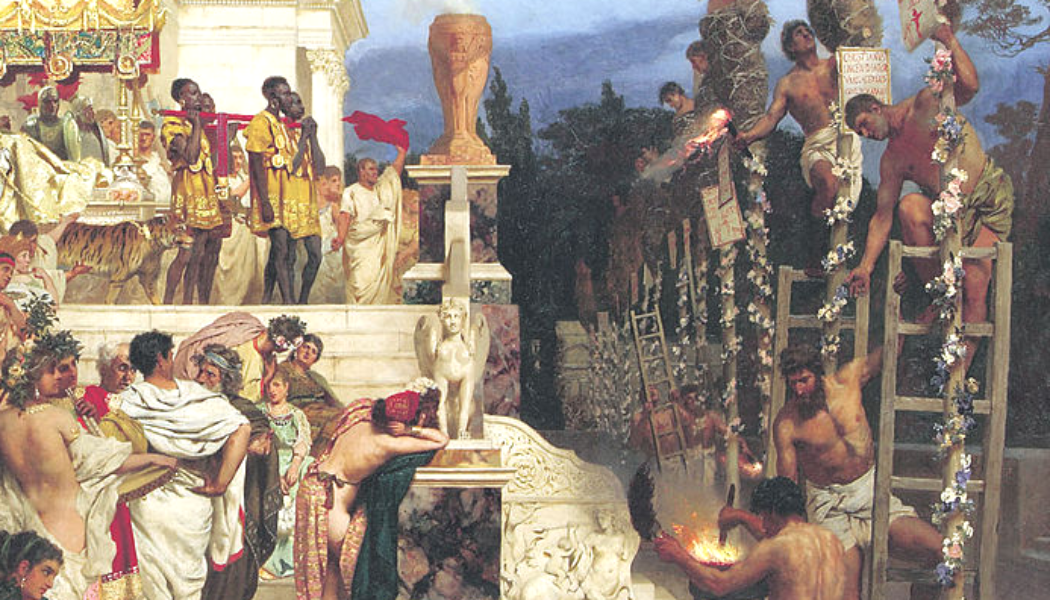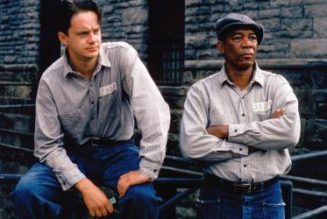Nero used Christians as torches
” data-medium-file=”https://thefivebeasts.files.wordpress.com/2017/03/torches1.png?w=298″ data-large-file=”https://thefivebeasts.files.wordpress.com/2017/03/torches1.png?w=693″ class=”alignnone size-full wp-image-2266″ src=”https://thefivebeasts.files.wordpress.com/2017/03/torches1.png?w=863″ alt=”torches1″ srcset=”https://thefivebeasts.files.wordpress.com/2017/03/torches1.png 693w, https://thefivebeasts.files.wordpress.com/2017/03/torches1.png?w=150 150w, https://thefivebeasts.files.wordpress.com/2017/03/torches1.png?w=298 298w” sizes=”(max-width: 693px) 100vw, 693px”>
One of the things critics of Christianity like to claim as false prophecy or grave error was the teaching by some of the apostles that Christ’s return was imminent and would occur during their lifetime or soon after. There are several passages in the New Testament they point to, including this one from the first epistle of St. Peter:
“The end of all things is at hand. Therefore, be serious and sober for prayers” (1 Peter 4:7).
Peter would have known better than to suggest that the return of Jesus was imminent. Just prior to the Ascension, at which Peter was present, Jesus was asked if he would soon establish his kingdom on earth, his response was clear enough:
“It is not for you to know the times or seasons that the Father has established by his own authority” (Acts 1:7).
Jesus had repeated this on numerous occasions:
“But of that day or hour [the return of Christ], no one knows, neither the angels in heaven, nor the Son, but only the Father” (Mark 13:32).
Peter had also been present when Jesus prophesied to the disciples about the timing of his return:
“When you hear of wars and insurrections, do not be terrified; for such things must happen first, but it will not immediately be the end. …Nation will rise against nation, and kingdom against kingdom. There will be powerful earthquakes, famines, and plagues from place to place; and awesome sights and mighty signs will come from the sky” (Luke 21:9-11).
Carefully note two things that Jesus says here: (1) the wars, disasters, and cosmic phenomena must occur before the end can arrive; and (2) the end does not immediately follow them. Some period of time must pass that is undefined; it could be long or short. And in the next verse Jesus adds another set of events that must occur even before these events:
“Before all this happens, however, they will seize and persecute you, they will hand you over to the synagogues and to prisons, and they will have you led before kings and governors because of my name” (vs. 12).
Yet, in the very same context of Luke 21, Jesus, like Peter, warns his disciples to be alert because his return, the end, could be imminent:
“Beware that your hearts do not become drowsy from carousing and drunkenness and the anxieties of daily life, and that day catch you by surprise like a trap. For that day will assault everyone who lives on the face of the earth. Be vigilant at all times and pray that you have the strength to escape the tribulations that are imminent and to stand before the Son of Man” (Luke 21:34-36).
So even for Jesus, despite his teaching earlier in the chapter, the end, or the day that he describes as a “trap”, should be regarded as imminent. Peter was a good student because this is exactly what he wrote in his letter, using the same exhortations as Jesus: to pray, be vigilant, and maintain sobriety in mind and body. Jesus adds that these are necessary to cope with the coming “tribulations” (persecutions) which he clearly identifies as imminent.
Moreover, tribulations were the same concern of Peter. Five verses after he warns “the end is at hand” he refers to a persecution of Christians which he calls “trial by fire” that was already happening:
“Beloved, do not be surprised that a trial by fire is occurring among you, as if something strange were happening to you, But rejoice to the extent that you share in the sufferings of Christ, so that when his glory is revealed you may also rejoice exultantly” (1 Peter 4:12-13).
In fact, the main subject of Peter’s epistle which is five chapters long is how to cope while experiencing persecution (esp. 2:11-5:11). He wrote the letter while in prison in Rome shortly before his death during the reign of Emperor Nero, whose persecution of Christians was reported by Roman historian Tacitus (who personally hated Christians):
“Their deaths were made farcical. Dressed in wild animals’ skins, they were torn to pieces by dogs, or crucified, or made into torches to be ignited after dark as substitutes for daylight. …Despite their guilt as Christians, and the ruthless punishment it deserved, the victims were pitied. For it was felt that they were being sacrificed to one man’s [Nero’s] brutality rather than to the national interest.” †
The key lines are when Jesus said, “before all this happens…” and when Peter said, “the end of all things is at hand”. For Jesus, the events leading to the end had not started yet but were imminent, but for the imprisoned Peter they had started because the persecutions were underway. For both Jesus and Peter, the return of Christ is initiated by persecutions followed by wars etc. The length of all this was not disclosed by Jesus and could possibly progress quickly. The relationship of the Jews with the Roman authorities in Jerusalem at the time was rapidly deteriorating into open rebellion.
There is another element to this question of the end being near that is not mentioned in these texts, but I believe is relevant, human mortality. Death is de facto the end times for the deceased as described in the Catechism:
“Each man receives his eternal retribution in his immortal soul at the very moment of his death, in a particular judgment that refers his life to Christ: either entrance into the blessedness of heaven-through a purification or immediate and everlasting damnation” (CCC, 1022).
Since death can be untimely, we must remain vigilant according to Thomas à Kempis (1380-1471):
“Every action of yours, every thought, should be those of one who expects to die before the day is out. Death would have no great terrors for you if you had a quiet conscience …. Then why not keep clear of sin instead of running away from death? If you aren’t fit to face death today, it’s very unlikely you will be tomorrow” (The Imitation of Christ, Bk. 1, Chap. 23)
The fiery 18th-century preacher Johnathan Edwards was well-known for his sermons on the dangers of death and hell, often adding this warning:
However unconvinced you may now be of the truth of what you hear, by & by you will be fully convinced of it (Sinners in the Hands of an Angry God ca. 1741).
…rjt
†Tacitus, Publius Cornelius. The Annals of Imperial Rome. Translated by Michael Grant. New York: Penguin Books, 1983.









